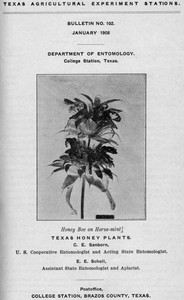Texas Honey Plants by Charles Emerson Sanborn and Ernest E. Scholl
"Texas Honey Plants" by Charles Emerson Sanborn and Ernest E. Scholl is a scientific publication produced in the early 20th century. This book serves as a detailed reference guide on various honey-producing plants found throughout Texas, presenting valuable information for apiarists and those interested in beekeeping. As part of the Texas Agricultural Experiment Station's bulletin series, it highlights the interaction between bees and local flora, which is critical for understanding the environmental
factors that affect honey production. The book provides an extensive listing of honey plants, categorized by families, complete with descriptions, geographical distributions, and insights into their pollen and nectar yields. Each entry details the plants' flowering periods and their roles in supporting bee populations, particularly emphasizing which species are beneficial for brood rearing and honey production. Moreover, the publication notes the implications of environmental variables on plant yields, making it a practical tool for beekeepers in selecting optimal locations for their apiaries and enhancing their honey production efforts. (This is an automatically generated summary.)
Read now or download (free!)
| Choose how to read this book | Url | Size | ||||
|---|---|---|---|---|---|---|
| Read online (web) | https://www.gutenberg.org/ebooks/39357.html.images | 126 kB | ||||
| EPUB3 (E-readers incl. Send-to-Kindle) | https://www.gutenberg.org/ebooks/39357.epub3.images | 169 kB | ||||
| EPUB (older E-readers) | https://www.gutenberg.org/ebooks/39357.epub.images | 170 kB | ||||
| EPUB (no images, older E-readers) | https://www.gutenberg.org/ebooks/39357.epub.noimages | 99 kB | ||||
| Kindle | https://www.gutenberg.org/ebooks/39357.kf8.images | 225 kB | ||||
| older Kindles | https://www.gutenberg.org/ebooks/39357.kindle.images | 209 kB | ||||
| Plain Text UTF-8 | https://www.gutenberg.org/ebooks/39357.txt.utf-8 | 82 kB | ||||
| Download HTML (zip) | https://www.gutenberg.org/cache/epub/39357/pg39357-h.zip | 165 kB | ||||
| There may be more files related to this item. | ||||||
About this eBook
| Author | Sanborn, Charles Emerson, 1877- |
|---|---|
| Author | Scholl, Ernest E. (Ernest Emmett), 1881- |
| Title | Texas Honey Plants |
| Note | Reading ease score: 60.7 (8th & 9th grade). Neither easy nor difficult to read. |
| Credits | Produced by Frank Zago |
| Language | English |
| LoC Class | QK: Science: Botany |
| LoC Class | SF: Agriculture: Animal culture |
| Subject | Bee culture |
| Subject | Honey plants -- Texas |
| Category | Text |
| EBook-No. | 39357 |
| Release Date | Apr 3, 2012 |
| Most Recently Updated | Aug 25, 2013 |
| Copyright Status | Public domain in the USA. |
| Downloads | 111 downloads in the last 30 days. |
| Project Gutenberg eBooks are always free! | |

